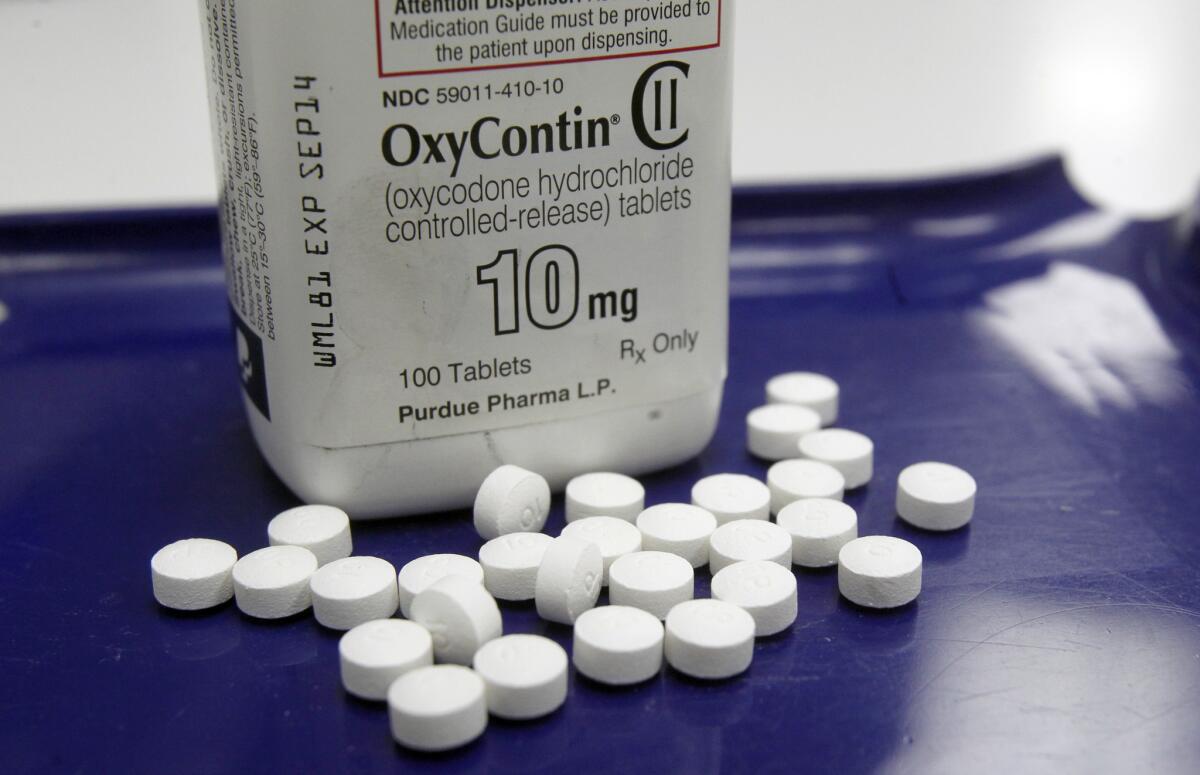Heroin resurgence an ‘unintended consequence’ of attempt to curb OxyContin abuse, study finds

- Share via
In an attempt to stem abuse of OxyContin, Purdue Pharma spent a decade and several hundred million dollars developing a version of the painkiller that was more difficult to snort, smoke or inject. Since those “abuse-deterrent” pills debuted six years ago, misuse of OxyContin has fallen and the company has touted them as proof of its efforts to end the opioid epidemic.
But a study released Monday found that rather than curtail deaths, the change in OxyContin contributed heavily to a surge in heroin overdoses across the country and that as a result there was “no net reduction in overall overdose deaths.”
Experts have long blamed skyrocketing heroin use on painkiller addicts transitioning to the cheaper, more easily available street opioid. But the study by scientists at the University of Pennsylvania and Rand Corp. was the first large-scale research to tie the alarming growth in heroin deaths to Purdue’s introduction of new pills.
“Our results imply that a substantial share of the dramatic increase in heroin deaths since 2010 can be attributed to the reformulation of OxyContin,” the authors wrote.
In response to the study, the company issued a statement noting that government officials have been urging drug companies to develop abuse-deterrent painkillers like the reformulated OxyContin. The Food and Drug Administration has approved eight abuse-deterrent opioids, three of them made by Purdue. Abuse-deterrent OxyContin does not prevent the most common way of abusing the drug — simply swallowing whole pills — but it has cut back on abuse of the painkiller by 40%, according to some estimates.
“The White House, FDA, and DEA [Drug Enforcement Administration] consider abuse-deterrent technology to be an important part of a comprehensive approach toward combating prescription drug abuse that also includes prevention and treatment,” the statement said.
More than 7 million Americans are estimated to have abused OxyContin since its 1996 debut with some regions of the country more seriously affected. The researchers from Penn’s Wharton School and Rand analyzed levels of OxyContin abuse on a state-by-state basis in the years leading up to the pill reformulation and then looked at deaths from heroin in a three-year period after the change. They found that heroin deaths more than tripled, from 3,000 in 2010 to 10,500 in 2014. And states where OxyContin abuse rates were the highest “experienced the largest increases in heroin deaths,” the authors wrote.
Washington University School of Medicine professor Theodore J. Cicero, who separately has studied the role that OxyContin reformulation played in heroin addiction, said he found the Penn-Rand study credible.
Underlying their conclusions is the agony of withdrawal from opioids like OxyContin, he said. Addicts suddenly deprived pills they can inject or smoke “feel like they are going to die and the only relief is another opiate,” Cicero said. He said that looking back it is difficult to understand why experts in the field didn’t see that reformulation would lead to increased heroin use.
“It’s hard to imagine that all of us, the FDA included, didn’t pick up on this as a possibility,” he said.
The study authors referred to the deaths as an “unintended consequence” and one, Rand health economist Rosalie Liccardo Pacula, said Purdue deserved credit for trying to address a problem. She said that the study looked narrowly at what she called “the worst of the outcomes” — death — because data was available. The researchers were not able to tally people who had responded to the drug reformulation by getting clean or calculate the number of people who did not abuse it in the first place because of the change to the pill.
“We can’t say there was no benefit from the reformulation,” Pacula said. “We don’t know what the outcomes will be in terms of lives saved.”
ALSO
OxyContin goes global — ‘We’re only just getting started’
Maker of painkiller OxyContin loses legal battle to keep lawsuit records secret
How black-market OxyContin spurred a town’s descent into crime, addiction and heartbreak
More to Read
Sign up for Essential California
The most important California stories and recommendations in your inbox every morning.
You may occasionally receive promotional content from the Los Angeles Times.











